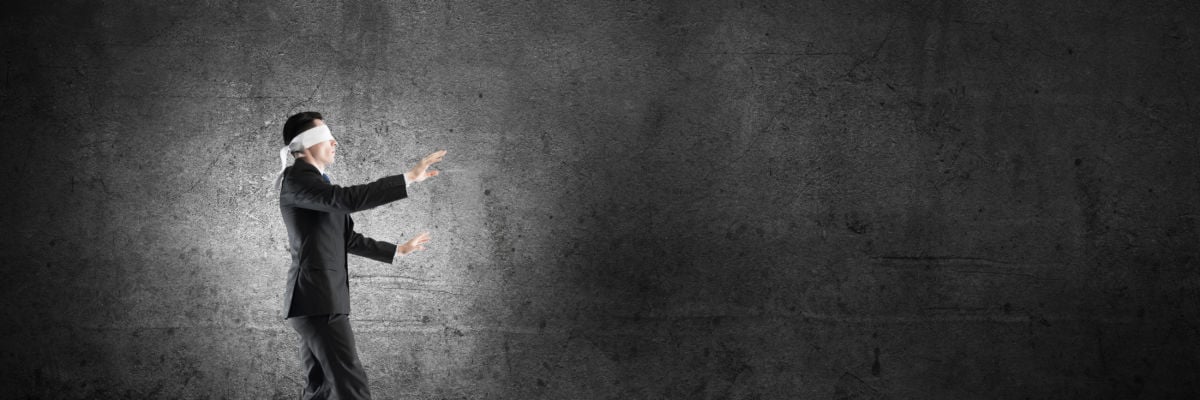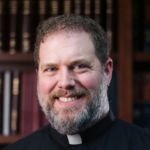
Behold, I will bring them from the north country,
and gather them from the farthest parts of the earth,
among them the blind and the lame,
the woman with child and her who is in travail, together;
a great company, they shall return here.
The “I” here, the speaker in Jeremiah 31, is of course the Lord of hosts, the God of Abraham, Isaac, and Jacob. The prophecy is about the end of exile and the end of diaspora; God’s promises to Israel were not in vain. Yet in the ministry of Jesus, the first Christians, who were Jews, began to see the unfolding of these promises. Rather than usher in a kind of final empire putting all other empires to shame, we see Jesus gathering the sick; the lame; and, today, the blind from the farthest parts of the earth—in becoming disciples, they join his body, which is itself the new temple: to be in him is to be home in Jerusalem, wherever we are in the world.
Bartimaeus, whom we meet in Mark, was, I have no doubt, a real historical person. But it also seems clear that Mark recognizes his symbolic import. Faced with the Messiah, much of Israel is simply blind. This intellectual and spiritual blindness does not correspond with the physical blindness of Bartimaeus. He, in fact, sees quite clearly, a fact that seems to bother the people in the crowd who would like to see miracles but not necessarily the dirty people who need them. But Bartimaeus sees clearly enough to ignore them. In an audience a few years ago, Pope Francis commented that Bartimaeus exhibits “that beautiful stubbornness of those who seek a grace and knock and knock on the door of God’s heart.”
This scene is a vivid reminder of why God saves the world in a strange way. Why, asks the thoughtful modern person, does this all-powerful God not simply fix things? Why go through this complicated history with chosen people and prophets and failure and then of all things an obscure incarnation leading up to death? It is the sort of question that makes a lot of sense until you actually look at the way human persons operate. We could have angelic messengers show up visibly in every household of the world to proclaim the truth of the gospel. Who would believe them? Some, surely, but I wouldn’t bet on a lot. And it’s not just that we remain in a time of deep distrust—which we do—but also that true freedom actually requires an act of trust, an act of faith. Freedom, for creatures who are not omniscient, is always stepping into the void. So to act as if we can do only things that we are 100 percent certain of is, once you get down to it, not to act at all.
Notice that when Jesus calls the blind man to him, he asks him what he wants. Again, we’re aware of a certain strangeness here. Surely Jesus knows. But, as St. Bede reminds us, the Lord wants him to make the prayer. He wants to accomplish the work with him, not simply to him. And he wants to emphasize that his power, great as it is, will not force its way. He will not make us love him. He will not force our happiness. He wants our faith—not because he needs it, but because we do if we are to approach him with freedom. This is the whole mystery of prayer. God doesn’t need our prayer, but he wants it. He wants to accomplish his salvation with and through us.
The blind man has faith, but is faith blind? I have been suggesting that Bartimaeus is not blind where it really matters: in the heart. Yet for many people, faith is opposed to reason. To do something “in faith” means to take a step without reasons, but simply out of a kind of blind trust.
This is emphatically not what the Catholic tradition understands faith to be. It is possible to have an irrational faith, but another word for that would just be bad faith. People do put their trust in the wrong things, even when they ought to know better. Right faith, virtuous faith, works in harmony with reason. As I said, most decisions we make force us to step into things that we do not fully know or understand. But that does not mean that we do not know or understanding anything. I may not be a very good mechanic or know how a car works, but I am not therefore incapable of driving. I know enough to make a reasonable act of faith in this particular form of technology.
The opposite of faith isn’t reason, but sight. So faith is blind, in a certain sense, because it means holding to something that you cannot fully see. But sight is, after all, only one of our senses. It is well known that those who are blind live with their other senses heightened. For a blind person to walk at all, then, may be an act of faith, but it is far more rational than many other things that seeing persons do all the time.
In any case, these ordinary acts of faith in everyday life are not especially praiseworthy; they’re just basic humanity. The blind man’s faith is notable because it is faith in Jesus. It is saving faith. And Bartimaeus realizes, more than most of the crowd, that you can’t get to sight without first having faith. Faith is in fact the engine of salvation. The divine physician is ready, but you do have to ask to be healed.
No one becomes a saint by accident, in the end. We have to choose. We have to pray. We have to follow the Lord when he calls us.



